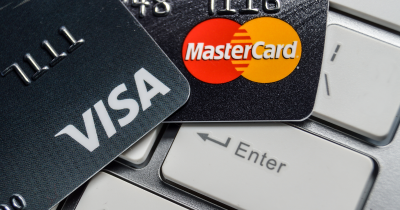Visa, Mastercard Won't Issue Their Own Cryptocurrencies
Both major credit card companies made important statements about cryptocurrency this week. Does that news point toward either company issuing its own cryptocurrency? Probably not.

Key Takeaways
- Mastercard and Visa have taken positive stances on blockchain and are working to provide access to crypto
- Patents and partnerships raise the possibility that either company might launch their own cryptocurrency, but it's unlikely
Share this article
Visa and Mastercard both made key announcements regarding their stance on digital assets and cryptocurrencies this week.
Visa has reaffirmed its relationships with cryptocurrency companies such as Coinbase, Fold, and Anchorage. Meanwhile, Mastercard says that it will expand its range of crypto card partnerships, beginning with the payments company Wirex.
Today, Mastercard announced the expansion of its #cryptocurrency program. This move makes it simpler and faster for partners to bring secure, compliant payment cards to market and easier for consumers to hold and activate cryptocurrencies. https://t.co/6xhiRk1YTM pic.twitter.com/2l8YypSMFp
— Mastercard News (@MastercardNews) July 20, 2020
The pro-crypto stance of each company raises an important question: whether either firm will move beyond simple partnerships and introduce its own cryptocurrency.
Visa, Mastercard Patents Suggest Crypto Projects
Both companies seem to be considering blockchain technology, at least in theory. Mastercard has filed over 80 blockchain patents, while Visa has filed over 24 blockchain patents.
Visa, for example, has filed a patent for a digital currency that could rely on Ethereum. Mastercard, meanwhile, has filed a patent that could be used to create new permissioned blockchains with support for multiple currencies. However, on closer inspection, those patents typically describe ways in which the companies could handle cryptocurrencies or make use of blockchain technology. They do not suggest that Mastercard or Visa are planning to issue a Bitcoin-like cryptocurrency.
Furthermore, there is no guarantee those patents will be put into practice; Mastercard and Visa simply control the intellectual property for the technologies those patents describe.
Regulations Pose Issues for Cryptocurrency
Regulations could also discourage Mastercard and Visa from creating a cryptocurrency. Though both companies are in a position to navigate those regulations, doing so might take time.
Relevant is the fact that both companies left Facebook’s Libra Association over regulatory concerns in late 2019. Alfred F. Kelly, CEO of VISA, has said that VISA did not see “how regulatory requirements were going to be able to be met” by Facebook. Mastercard CEO Ajay Banga, meanwhile, has said that Libra could not commit to being “fully compliant with local law.”
Given that Mastercard and Visa have high standards for regulatory compliance, both companies would surely go to great lengths before offering a cryptocurrency product to the general public.
Stablecoins are Feasible
If Mastercard or Visa ever launch a blockchain project that is thoroughly their own, it seems likely that they would imitate banks and companies that have already done so.
JP Morgan provides one model. The firm launched its Quorum blockchain in 2016 and initially used it to handle clients’ custom assets. Later, JP Morgan announced JPM Coin, a privately circulated stablecoin that might eventually trade publicly. Wells Fargo, which has built an internal stablecoin on Corda’s enterprise blockchain, provides a similar model to follow.
Mastercard and Visa have no plans to create a stablecoin in this vein, but banks have paved the way for such a product.
The Immediate Future: Blockchain
Right now, most companies are naturally working with Bitcoin and other popular cryptocurrencies that are in high demand.
Visa and Mastercard realize this: Visa says that it “plans to support the digital currencies and blockchain networks that our clients and partners demand.” In contrast, Mastercard says that its crypto efforts are based on “consumer interest and investment.”
Other notable payment companies are also focusing on existing cryptocurrencies. Square’s Cash App has supported Bitcoin since 2017, while corporate insiders say that PayPal plans to offer crypto trading by the end of the summer. To face the competition, Visa and Mastercard only need to offer access to crypto; they do not need to create their own coin.
It must also be noted that greater involvement of credit card companies may be damaging to crypto, as those companies can exercise control over people’s transactions, counter to the ethos of Bitcoin.
Share this article
